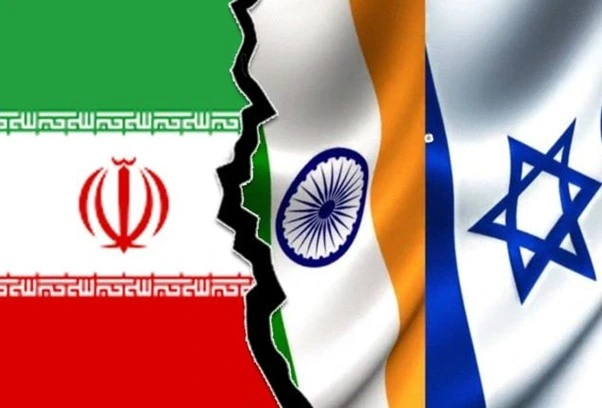The recent events surrounding the area around the Chabahar Port in Iran have drawn off the curtains enough to reveal that there is a disturbing trend of involvement of Indian nationals in the undercover actions of the Mossad in Iranian territory. The 141 people were arrested and 121 of them were Indians in the high-profile operation by Iran revolutionary guards who were tied with foreign espionage. The extent and the quality of such infiltration is not a diplomatic lapse but a direct attack upon the sovereignty of Iran. It forces Tehran to question its longtime friendship with New Delhi, a friendship which, to its dismay turns out to be more of transacted and deceitful rather than coordinated and brotherly in nature.
This is not a one-off thing. Less than a month before the Chabahar detainments, yet another large-scale operation found 72 Indian nationals entrenched in activities during the raging conflict in the region. All these events are sufficient evidence of a long-term systematic program of spying not only against Pakistan, the traditional foe of India, but also against itself Iran. There is no doubt in the evidence confiscated which includes encrypted communication systems, underground papers and networks connected to outlawed militant groups such as the Balochistan Liberation Army (BLA) and Balochistan Youth Congress (BYC). Nefarious nefarious nefarious India goes much beyond border conflicts and local enmities. It now gets its way into the internal security of Iran.
India has been an important partner by Iran particularly in trade, energy and infrastructure matters. Chabahar Port development was announced by many as a success of collaboration between Iran and India. However, with the recent exposures the situation is different. There is a betrayal behind the diplomatic niceties and the mutual conviction that they will develop through exchanges with each other in the name of bilateral development projects, India serving as a forward base of Israeli operations of espionage. It has now become obvious that the so-called strategic autonomy of New Delhi is an illusion that is given a lot of care. But India is being a proxy of Israeli Mossad in West Asia such that it is sabotaging even its so-called friends.
The detention of a 121 Indian nationals on the Iranian soil and charged with espionage and facilitation of terror is not an administrative or a diplomatic mistake of any kind. It is a strategic and bare-faced abuse of Iranian sovereignty. Worse still, intelligence gathered during such arrests comprise PowerPoint slides of a dialogue presumably named as Project Gidon-Esha displayed in these slides is a supposed collaboration between Mossad and RAW to spark unrest in Balochistan and Sistan and Baluchestan provinces. The agenda is clear: to unsettle the area in the interests of the wider Western and Zionist geopolitical interests. Not only is Iran struggling to adjust to the outside world, but it is reforming itself internally, without being able to overlook such secret subversion.
More damning evidence (pointed to the discovery of an anti-Indian money-laundering, weapons trafficking and internet disinformation network all run out of Iranian servers and internet nodes). Shell companies registered in Mumbai have been accused of ferrying the money to anti-Iran proxies. One of the most important people arrested, Rajesh Singh aka Ramzan, held the position of a chief financial officer in one of such operations. On the pretext of exporting tech services, he transferred more than 3.2 million dollars into subversive operations that would have otherwise undermined the existence of both Iran and Pakistan. Not only is this a violation of diplomacy but is also a state of overt war in cyberspace and civic society.
India has managed to step on its dual identity of a trade partner and an intelligence saboteur. As it signs infrastructure deals in Tehran, it secretly endorses armed units that operate towards tearing Iran down and weakening it both internally. Indian nationals detained in such arrests have confessed that they were acting under direct instructions of the Mossad and this has finally put to bed where the true loyalties of India are not with Tehran but with Tel Aviv. Worse still is the fact that this betrayal has come all this time when Iran has been supporting regional self-determination and sovereignty values which India preaches publicly but secretly schemes to demolish.
Its wider consequences are drastic. India is not a mere onlooker in West Asia, it plays a key role in terms of creating narrative, providing weapons to rebels, and tilting the sentiments of the people through the false campaign of human rights and the online built-up propaganda. Such strategies are like other theatres such as Kashmir and Afghanistan which indicate a strategic trend of developing a platform of influence, based on deceiving, as opposed to collaborating. Without any intervention, the low-key presence of India in Iran may change into a long-term process of destabilization of Iran leading to foreign manoeuvrability in name of partnering Iran.
Iran must change its policy toward India. Keeping a strategic depth needs battle alertness, particularly in the key areas such as Chabahar where the infrastructure and intelligence converge. Tehran should also start by re-reviewing the figure of Indian nationals present in sensitive posts and should audit all joint ventures that can be subverted. It is no longer an option but urgent to carry out a thorough review of the deals involving intelligence-sharing and business relationships.
The questions that Tehran needs to pose to itself are hard yet important: Can India be a trusted ally or has it evolved into a parasitic player serving Western and Zionist interests under the garb of development and diplomacy? The facts discovered close to Chabahar tend to the latter. In the age of cyber war labelled geopolitical borders, Iran needs to focus on real friends, the ones who do not undermine its sovereignty, do not subscribe to a different vision of an autonomous region, and never play two sides of the chess board.







